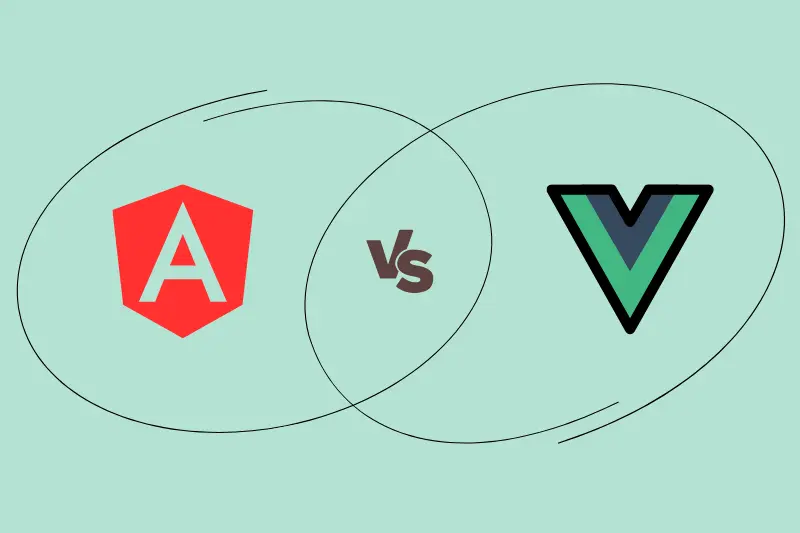Node.js and PHP are two major technologies for back-end development. PHP has been around for nearly three decades and powers about 76% of websites today. While Node.js is a newer technology, it is growing quickly because it can handle server-side and client-side tasks.
Choosing between Node.js and PHP for your next project can be challenging. Should you use Node.js, known for its speed and versatility, or stick with the reliable and efficient PHP?
Both are excellent choices. Even though they seem different, many developers often ask, "Which is better, Node.js or PHP?" To make the best decision, you must understand what each offers.
In this blog, we'll compare Node.js and PHP, looking at their features, differences, benefits, and when to use each.
Let's get started!
What is PHP?
PHP, also known as Hypertext Preprocessor (originally known as Personal Home Pages), is an open-source, object-oriented server-side scripting language used for web development.
It is a versatile tool for creating web servers. It can execute within web browsers or command-line interfaces, offering developers control over their code output.
Powered by the Zend Engine, PHP boasts various implementations beyond the standard, including Parrot, HipHop Virtual Machine (HHVM), and JPHP, developed to address specific performance and optimization needs.
For those prioritizing performance, speed, and security, PHP 8.3 is the most recommended version to use.
Why Use PHP?
PHP continues to be a dominant force in web development. According to the Developer Survey, almost 20% of professional developers who are heavily involved in programming use PHP as their preferred language.
Let's check out the important aspects of using PHP.
Cross-Platform Compatibility: PHP easily integrates with major operating systems like Windows, Linux, and macOS. It also supports popular web servers like XAMPP, Wamp, Nginx, OpenBSD, and Apache Tomcat and is compatible with cloud platforms such as Microsoft Azure, Oracle Cloud, and Amazon AWS.
HTML-Friendly Nature: PHP provides an easy transition for those familiar with HTML. It lets you seamlessly switch between PHP and HTML on a page, so developers can add functionality while sticking to the HTML design.
Server-Side Scripting: PHP is the most widely used server-side scripting language. It processes scripts on the server side, differentiating it from client-side languages like JavaScript. This enables personalized user interfaces and extends capabilities beyond HTML, allowing the creation of various file formats like PDF, JPEG, GIF, and PNG.
Database Connectivity: PHP's adaptability shines through its extensive database support, including MySQL, PostgreSQL, MS SQL, db2, Oracle Database, and MongoDB. This flexibility empowers developers to select the perfect database for their application needs.
Web Compatibility: PHP seamlessly integrates with a wide range of web technologies, ensuring compatibility with cloud services and smooth HTML integration. Its versatility aligns with other programming languages and is commonly featured across various application development stacks.
Rich Library Ecosystem: PHP boasts many libraries and frameworks, such as Symfony, Laravel, and CodeIgniter, which accelerate development by providing pre-built modules and components. These libraries cover many functionalities, including authentication, caching, and templating, enabling developers to build robust applications
Rapid Prototyping: PHP's simplicity and ease of use make it an ideal choice for fast prototyping and iterative development. With its lightweight syntax and minimal setup requirements, developers can quickly create and test new ideas, repeat features, and gather feedback from stakeholders, ultimately speeding up the development cycle and time-to-market.
Community Support: PHP boasts a vibrant and active community of developers, enthusiasts, and contributors who continually enhance the language's ecosystem through collaboration, knowledge-sharing, and open-source contributions.
This community-driven approach ensures that PHP remains up-to-date with emerging trends, security patches, and best practices, providing developers with a reliable support network and valuable resources for troubleshooting and learning.
Pros and Cons of PHP
If you hire PHP developers, you will encounter both pros and cons can impact your project. Let's explore a few of them here.
Pros of PHP
Low Maintenance: PHP is the most cost-effective language, allowing developers to make changes and update their code with minimal disruption. This flexibility results in lower maintenance costs and simpler code management. It supports a wide range of databases and web servers, reducing maintenance efforts by making it easy to integrate and update various web application components.
User-friendly: PHP is made to be easy to use, making it an excellent choice for beginners. Its syntax is clear and similar to C, so new developers can learn it quickly. Moreover, PHP code can be easily embedded into HTML, making it simpler to create dynamic web pages.
Thorough Documentation and Resources: PHP has excellent documentation. The official PHP manual is comprehensive and includes comments from many developers who provide real-world examples and solutions. Numerous forums, tutorials, and books are available, making learning and troubleshooting PHP relatively easier than many other programming languages.
Cost-effective: As an open-source and free-to-use language, PHP can help lower the overall cost of developing web applications. Additionally, PHP runs on various platforms (Windows, Linux, Unix, etc.). It works with almost all servers used today (XAMPP, Wamp, Apache, IIS, etc.), minimising server and operating system licensing fees.
Automation: PHP scripts can automate everyday web development tasks, such as sending emails, managing data, and handling user input, which can save time and reduce errors. This automation capability makes PHP practical for developing complex, dynamic websites and online applications that require frequent updates and maintenance.

Cons of PHP
Inconsistent Standard Library: PHP's standard library is often criticized for its lack of consistency. Functions in the library can have different naming conventions, parameter orders, and types of return values. This inconsistency can make the learning curve steeper for new developers and complicate the development process. Developers may need to refer to the documentation more frequently to understand function specifics.
Outdated Procedure: PHP was originally designed to add small amounts of interactivity to static HTML pages. While it has evolved significantly, some of its older features and practices are considered outdated. This includes global variables and the use of the register_globals feature, which can lead to poorly organized code and security issues.
Security Flaws: PHP is vulnerable to various security risks such as SQL injection, cross-site scripting (XSS), and remote code execution. The language provides many powerful features that, if not used carefully, can expose web applications to security breaches. This requires developers to be very vigilant and strictly follow best security practices.
Shared Hosting Limitations: Many PHP applications are hosted on shared servers due to cost advantages. However, shared hosting can pose several limitations, such as restricted access to server configuration, limited resources, and potential security risks from other hosted applications. These limitations can affect the performance and scalability of PHP applications.
Performance Overhead: PHP is an interpreted language, which means it is executed at runtime. This can lead to much slower performance compared to compiled languages. Although this might not be noticeable in small-scale applications, it can become a significant bottleneck for large-scale, high-traffic applications. Optimization and proper server configurations can help alleviate some performance issues, but inherent limitations remain.
Popular WebApps Using PHP
PHP maintains a dominant presence on the web, powering over 76% of websites. Here are some examples of those companies.
- WordPress
- Slack
- Wikipedia
- Tumblr
- Slack
- Shopify
- Dropbox
- Mailchimp
- DailyMotion
How Does PHP Works in Backend Development?
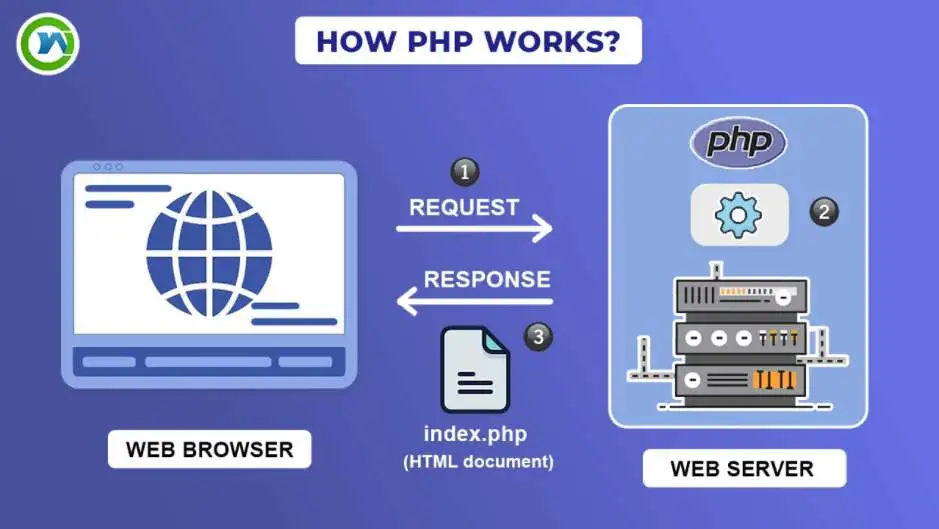
When to use PHP?
PHP remains the preferred technology for your stack in various scenarios, including:
- CMS-driven eCommerce websites or content management systems like WordPress, Drupal, and Joomla.
- Projects utilizing the LAMP Stack (Linux, Apache, MySQL, PHP) for their server infrastructure.
- Rapid prototyping and development due to PHP's ease of deployment and integration with existing web technologies.
- Applications requiring extensive database connectivity and interaction, such as online forums and community websites.
- Server-side scripting tasks and server-rendered web pages, particularly for projects focusing on server-side logic and functionality.

Popular PHP Frameworks
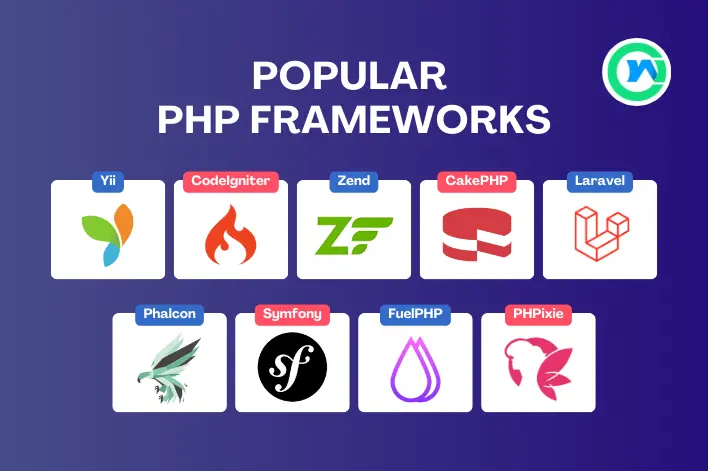
What is Node.js?
Node.js is a runtime environment for building fast and scalable server-side and networking applications. It operates on an event-driven, non-blocking I/O architecture, making it efficient for real-time application development.
Built on the Google V8 JavaScript runtime engine, Node.js combines JavaScript with C and C++ programming languages. This combination Node.js to handle system-level tasks and communicate with servers efficiently.
By incorporating features from C++, Node.js gains the ability to manage computer characteristics directly, enhancing its performance and versatility. This unique architecture makes Node.js suitable for both server-side and client-side development tasks.
Why Use Node js?
Node.js is a widely adopted technology for web development, with its popularity growing steadily.
Here's why developers choose Node.js:
Full Stack JS: With Node.js, developers can code both client-side and server-side applications using JavaScript. This integration streamlines development and eliminates the need for separate frontend and backend teams, resulting in efficient resource utilization.
Simplicity: Node.js is known for its simplicity, making it an excellent choice for beginners in web programming. It offers many tutorials and a supportive user community, making it easy to get started.
Non-blocking Code: Node.js utilizes an event-driven, non-blocking I/O model, allowing programs to pause or sleep while handling other requests. This approach enhances application performance and responsiveness, particularly for applications with high concurrency.
Fast and Scalable: Node.js is single-threaded, enabling it to handle numerous connections with high performance. Its non-blocking thread execution further contributes to speed and efficiency, making it suitable for scalable applications.
Powerful Backend Connection: Developed in C and C++, Node.js establishes a direct and robust connection with the server, enhancing backend performance and reliability.
Vast Ecosystem: Node.js boasts a vast ecosystem of open-source packages, with over 1 million packages available on the NPM registry. These packages offer a wide range of functionalities to aid in project development.
IoT Protocol Support: Node.js requires minimal server-side memory and resources, making it ideal for IoT development. It supports protocols like MQTT, commonly used in IoT applications, enabling seamless integration of independent devices.
Real-Time Applications: Node.js is well-suited for building real-time applications such as chat applications, online gaming platforms, and collaboration tools. Its event-driven architecture and WebSocket support enable seamless bi-directional communication between clients and servers, facilitating real-time updates and interactions.
Microservices Architecture: Node.js is great for building microservices architecture, where applications are divided into smaller, independent services. Its lightweight and modular nature makes it ideal for building and deploying microservices, allowing developers to scale and manage individual components more efficiently.
Community Support: Node.js benefits from a thriving global community of developers contributing to its improvement and expansion. This open-source approach fosters growth, providing valuable assistance and resources to beginners and seasoned professionals.
Pros and Cons of Node.js
If you hire Node js developers, you will encounter both pros and cons for your upcoming projects. Let’s check out some of them.
Pros of Node.js
Enhanced Scalability: Node.js effortlessly manages workload across multiple CPU cores using cluster modules. Its event-driven architecture ensures real-time processing, enabling servers to handle numerous connections simultaneously without performance issues.
Cross-Platform Development: Node.js simplifies cross-platform development with tools like NW.js and Electron, eliminating the need for platform-specific code. Integration with Google tools enhances development, and productivity and ensures consistent device performance.
JSON Integration: Node.js naturally supports JSON, facilitating seamless data exchange and simplifying API creation, particularly for NoSQL databases like MongoDB. Leveraging JavaScript throughout the stack improves compatibility and enhances data transfer.
Accelerates Time-to-Market: Node.js accelerates development cycles with its lightweight environment and extensive library ecosystem. Access to many libraries on platforms like GitHub reduces development time and helps teams work faster, allowing products to reach quickly.
Google Support: Built on Google's V8 engine, Node.js benefits from Google's extensive developer ecosystem. Efficient execution of both frontend and backend JavaScript ensures rapid development and debugging. With Google's support, Node.js users gain access to advanced tools and resources for building high-performance applications.
Looking to Hire Dedicated Laravel Developers? Hire Us!
Cons of Node.js
Limited Multi-threading Support: Node.js is not optimized for heavy computational tasks that require multi-threaded processing. While it can handle more sophisticated applications than some languages like Ruby, reliance on multi-threaded operations may degrade performance. As a result, Node.js is best suited for single-threaded systems to avoid wasting processing power and time.
API Instability: The Node.js API undergoes frequent changes, which can be disruptive for developers. Each new API release may include changes incompatible with previous versions, requiring frequent updates to your existing code. This instability can lead to compatibility issues and require developers to adapt quickly to new API features and changes.
Callback Complexity: Due to its asynchronous nature, Node.js relies heavily on callbacks, leading to what is commonly referred to as "callback hell." Nested callbacks can make code difficult to read and maintain, reducing code quality and increasing the risk of errors. Asynchronous programming patterns such as promises and async/await can somewhat mitigate this issue but may introduce their own complexities.
Limited Standard Library: Unlike other platforms, Node.js has a relatively small standard library. While the Node Package Manager (NPM) provides access to a vast repository of third-party modules, heavy reliance on external packages can introduce dependencies, compatibility issues, and security vulnerabilities. Developers must carefully manage dependencies to ensure the stability and security of their applications.
Debugging Challenges: Debugging asynchronous code in Node.js can be challenging due to its event-driven architecture and callback-based programming model. Identifying and resolving errors, especially in nested callback chains, can be time-consuming and require familiarity with asynchronous debugging techniques. Additionally, the lack of built-in debugging tools may require third-party solutions, adding complexity to the debugging process.
Popular WebApps Using Node.js
Node.js has become popular for many big players in various industries. Let's take a look at some of the industry leaders that use Node.js.
- Netflix
- PayPal
- Uber
- eBay
- Medium
- GoDaddy
- Groupon
- Yandex
- BBC
How does Node.js work in backend development?
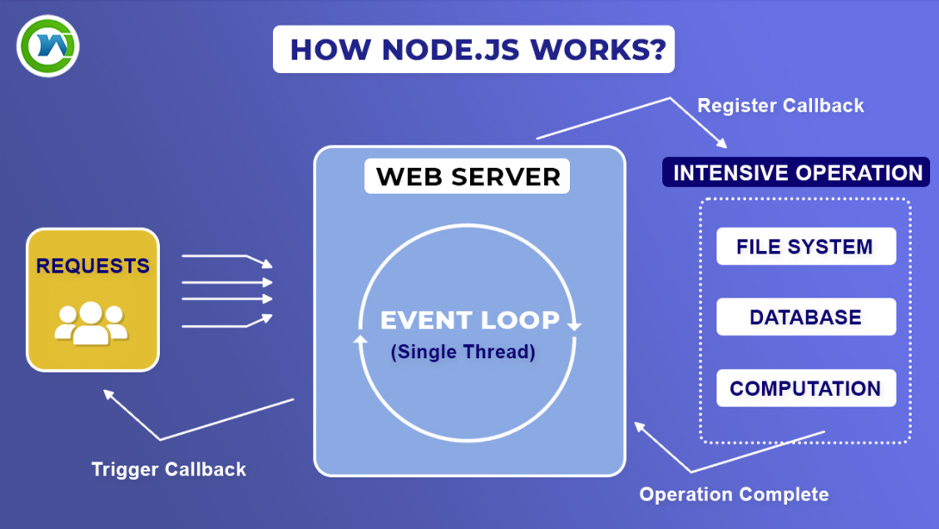
When to use Node.js?
Node.js is an excellent choice for custom enterprise web development to leverage its performance and development ease. Consider using Node.js for:
- Real-time applications like instant messengers, chat applications, and collaboration tools.
- Dynamic single-page applications that require responsive user interfaces and seamless data updates.
- Projects utilizing front-end technologies such as TezJS, React, Angular, and Vue.js.
- Applications requiring high scalability and concurrency, such as social media platforms and online gaming.
- Microservices architecture, where applications are divided into smaller, independent services for easier development, deployment, and scaling.
Popular Node.js Frameworks
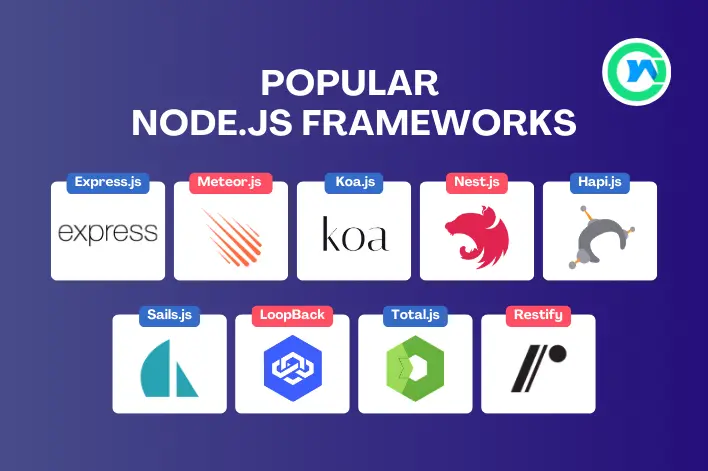
Node.js vs PHP: A Comparison Table You Must Check
| PHP | NODE.JS | |
|---|---|---|
| Type | Programming Language | Javascript runtime environment |
| Engines | Zend engine | Google’s V8 javascript engine |
| Complexity Of Use | Simpler to use compared to Node.js | Complex to use compared to PHP |
| JSON | JSON_encode() and JSON_decode() | JSON.stringify() and JSON.parse() |
| Concurrency | Multi-threaded blocking I/O | Event-driven non-blocking I/O |
| Execution | Synchronous | Asynchronous |
| Execution Speed | Slower compared to Node.js | Faster and lightweight |
| Frameworks | Laravel, Symphony, CodeIgniter, CakePHP | MVC and Express Frameworks, Total.js, Hapi.js, Koa.js |
| Web Server | Apache and IIS | Does not required |
| Package Manager | Composer Package Manager | Node Package Manager (NPM) |
| Database | Conventional and Relational | Any database |
| Community | Vast online community | Small and active |
Looking to Hire Dedicated Backend Developers? Hire Us!
Final Thoughts: Node js vs PHP
Choosing between Node.js and PHP is crucial and can significantly influence your project. As a developer, it's important to understand what each technology offers to choose the one that best fits your project goals and team skills.
Node.js is known for its ability to handle apps requiring extensive real-time data processing. It is a great choice for applications like online games or chat services that require high performance and scalability. Many businesses leverage Node.JS Development Services to build such applications efficiently while ensuring scalability and robust performance.
PHP is simpler and a favourite for quickly creating traditional websites. It's a good option if you're starting or working on smaller projects that don't require complex data handling.
Choosing between Node.js and PHP isn't just about following the latest trends, it's about picking the technology to build high-quality digital products effectively. Whether you go with the versatile Node.js or the straightforward PHP, the key is to focus on creating excellent user experiences that last. Remember, the best tool is the one that fits your project's needs and helps you deliver great results.
